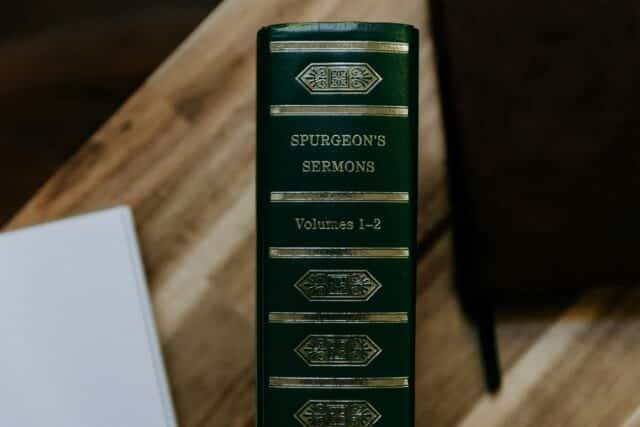Article
15 Points from Spurgeon on Praying in Public
Spurgeon dedicated an entire lecture in his Pastors’ College on how pastors should approach their prayers before the people.

Don’t overlook your public prayers.
It is too easy to fall into the practice of putting effort and thought into everything that happens on Sunday morning, except your prayers from the stage. These moments matter, are holy, and instructive. You are speaking with the Almighty. You are pleading for power, conversions, and blessings. The church is also learning how to pray as their pastor leads in prayer. Don’t underestimate the formative power of public prayer. Spurgeon knew this, too.
While Spurgeon is known as the Prince of Preachers, revealed in his excellent preaching and his passion to train others, he was also concerned for how planters and pastors prayed in public.
Spurgeon dedicated an entire lecture in his Pastors’ College on how pastors should approach their prayers before the people. I picked the best quotes from this lecture and summarized them into 15 tips from Spurgeon.
- There is Room for Improvement. Pray with Excellence.
“There is room for improvement, and in some quarters there is an imperative demand for it. Let me, therefore, very earnestly caution you, beloved brethren, against spoiling your services by your prayers: make it your solemn resolve that all the engagements of the sanctuary shall be of the best kind.”
- Sloppy, Careless, Mere Stage-Change Prayers are Awful.
“All our faculties should concentrate their energy, and the whole man should be elevated to his highest point of vigour while in public prayer, the Holy Ghost meanwhile baptizing soul and spirit with his sacred influence; but slovenly, careless, lifeless talk in the guise of prayer, made to fill up a certain space in the service, is a weariness to man, and an abomination to God.”
- Private Prayer Fuels Public Prayer.
“The secret is that we are not so really devout at heart as we should be. Habitual communion with God must be maintained, or our public prayers will be vapid or formal.”
- Prayer isn’t Performance.
“Let the Lord alone be the object of your prayers. Beware of having an eye to the auditors; beware of becoming rhetorical to please the listeners. Prayer must not be transformed into ‘an oblique sermon.’ It is little short of blasphemy to make devotion an occasion for display.”
- Don’t Fake It. It’s Gross. People Can Tell.
“Pray as your heart dictates, under the leading of the Spirit of God, and if you are dull and heavy tell the Lord so. It will be no ill thing to confess your deadness, and bewail it, and cry for quickening; it will be real and acceptable prayer; but simulated ardour is a shameful form of lying.”
- Be Godward in Your Prayers.
“Every word and thought must be Godward, and only so far touching upon the people as may be needful to bring them and their wants before the Lord. Remember the people in your prayers, but do not mould your supplications to win their esteem: look up, look up with both eyes.”
- Pray with Awe, Reverence, and Gravity.
“Our addresses to the throne of grace must be solemn and humble, not flippant and loud, or formal and careless. The colloquial form of speech is out of place before the Lord; we must bow reverently and with deepest awe.”
- Tone Should Match the Weighty Task.
“The voice should accord with the matter, and should never be boisterous, or self-asserting: humble and reverent let those tones be in which man talketh with his God.”
- Don’t be Bored or Disinterested.
“A sleepy prayer—what can make people more dislike going up to the house of God at all? Cast your whole soul into the exercise. If ever your whole manhood was engaged in anything, let it be in drawing near unto God in public.”
- Don’t Make “Father God” or “Lord” a substitute for “Uhms” or “Uhhs”.
“God’s name is not to be a stop-gap to make up for our want of words.”
- Don’t Preach in Your Prayer.
“Pray when you profess to pray, and don’t talk about it. Business men say, ‘A place for everything and everything in its place;’ preach in the sermon and pray in the prayer.”
- Pray the Bible … But Not the Whole Thing.
“It is not necessary in prayer to string a selection of texts of Scripture together, and quote David, and Daniel, and Job, and Paul, and Peter, and every other body, under the title of ‘thy servant of old.’ It is necessary in prayer to draw near unto God, but it is not required of you to prolong your speech till everyone is longing to hear the word ‘Amen.’”
- Stay Focused and on Topic.
“There are many topics which require your attention; the church in its weakness, its backslidings, its sorrows, and its comforts; the outside world, the neighbourhood, unconverted hearers, the young people, the nation. Do not pray for all these every time, or otherwise your prayers will be long and probably uninteresting.”
- Don’t Misquote God.
“I cannot, however, leave the point without urging upon you literal accuracy in all quotations from the word of God.”
- Don’t Pump Fake People.
“One little hint I cannot withhold—never appear to be closing, and then start off again for another five minutes. When friends make up their minds that you are about to conclude, they cannot with a jerk proceed again in a devout spirit. I have known men tantalize us with the hope that they were drawing to a close, and then take a fresh lease two or three times; this is most unwise and unpleasant.”




